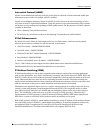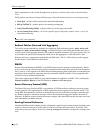
Software Supported
page 26 OmniSwitch 6800/6850/9000—Release 6.1.3.R01
Learned Port Security (LPS)
Learned Port Security (LPS) provides a mechanism for authorizing source learning of MAC addresses on
10/100/1000, Gigabit, and Gigabit Ethernet ports. Using LPS to control source MAC address learning
provides the following benefits:
• A configurable source learning time limit that applies to all LPS ports.
• A configurable limit on the number of MAC addresses allowed on an LPS port.
• Dynamic configuration of a list of authorized source MAC addresses.
• Static configuration of a list of authorized source MAC addresses.
• Two methods for handling unauthorized traffic: Shutting down the port or only blocking traffic that
violates LPS criteria.
LPS has the following limitations:
• You cannot configure LPS on 10 Gigabit ports.
• You cannot configure LPS on link aggregate ports.
Link Aggregation (static & 802.3ad)
Alcatel-Lucent’s link aggregation software allows you to combine several physical links into one large
virtual link known as a link aggregation group. Using link aggregation can provide the following benefits:
• Scalability. You can configure up to 32 link aggregation groups that can consist of 2, 4, or 8 Ethernet-
ports.
• Reliability. If one of the physical links in a link aggregate group goes down, the link aggregate group
can still operate.
• Ease of Migration. Link aggregation can ease the transition from a Gigabit Ethernet backbone to a 10
Gigabit Ethernet backbone.
• Interoperability with Legacy Switches. Static link aggregation can interoperate with OmniChannel
on legacy switches.
Alcatel’s link aggregation software allows you to configure the following two different types of link
aggregation groups:
• Static link aggregate groups
• Dynamic (802.3ad) link aggregate groups
Multicast Routing
The OmniSwitch 9000 switches support multicast routing on IPv4 and includes configuration options for
multicast address boundaries, the Distance Vector Multicast Routing Protocol (DVMRP), and Protocol-
Independent Multicast (PIM).
Multicast traffic consists of a data stream that originates from a single source and is sent to hosts that have
subscribed to that stream. Live video broadcasts, video conferencing, corporate communications, distance
learning, and distribution of software, stock quotes, and news services are examples of multicast traffic.
Multicast traffic is distinguished from unicast traffic and broadcast traffic.


















